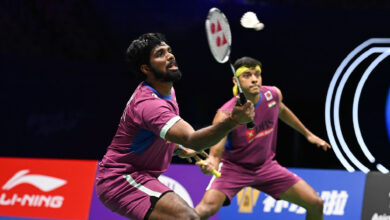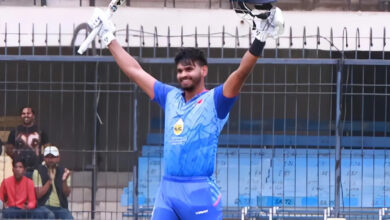Sri Lanka escape with draw in fading light

Virat Kohli let out a roar, Niroshan Dickwella provided feisty needle that has been largely absent in India v Sri Lanka encounters, and a fired-up Mohammed Shami and Bhuvneshwar Kumar showed fine fast-bowling skills, but a Test that had been mightily affected by rain finally ended in a thrilling draw at the Eden Gardens on Monday (November 20).
Kohli’s magnificent 104 not out had allowed India to declare at 352 for 8 midway through the second session, and Shami then bowled with fire, while Bhuvneshwar was his usual excellent self, but Sri Lanka hung on till the close to finish on 75 for 7 in 26.3 overs, having been set a winning target of 231.
Shami and Bhuvneshwar strove till the end and nearly pulled off a remarkable win for India, but the Sri Lankans held on grimly, if only by their fingernails. The ball beat the bat countless times, there were several close calls that had to be adjudicated via replays and the Indians were swarming all over the Sri Lankans, but eventually they couldn’t beat nature. Fading light in Kolkata meant the contest finished without a winner. There was no doubting who had bossed it though, with the home team roaring back despite being put in on an incredibly green track under heavy cloud cover, bowled out for 171, and conceding a first-innings lead of 122.
India’s declaration left Sri Lanka having to face 47 overs at a minimum to save the match, but the catch was that the fine print read, ‘light permitting’. In seven overs before tea, Shami and Bhuvneshwar accounted for Sadeera Samarawickrama and Dimuth Karunratne, both openers playing on to lose their stumps, and India came out needing eight wickets in the final session. Given the situation with the light at this time of the year particularly, India would have never realistically expected to bowl 40 overs in the final session. In the event, they managed less than half, with only 19.3 bowled before the umpires decided light had deteriorated enough to walk off. This match also marked a remarkable instance of all wickets in a home Test going to pacers for India.
Bhuvneshwar, the Man of the Match, was impeccable with figures of 4 for 8 in 11 overs, eight of which were maidens. Shami had 2 for 34, and while the wickets column perhaps didn’t show it, posed as much of a threat. Bhuvneshwar, who had 4 for 88 in the first innings too, continued his love affair with Eden Gardens, having taken a five-wicket haul in India’s last Test here, in October 2016 against New Zealand.
When play began in the final session, Sri Lanka lost both Lahiru Thirimanne and Angelo Mathews, the first-innings half-centurions, in quick time. Thirimanne was suckered into poking at Bhuvneshwar, while Mathews had to walk back after a good review by India, lbw to Umesh Yadav. Dinesh Chandimal and Dickwella got together for a counter-punching stand, Dickwella doing most of the punching with bat and mind games. Spotting three fielders behind square on the legside, he walked across his stumps to flick Shami into the stands and immediately pointed out to the umpires that it should be a no-ball. Later, he pulled away when Shami had begun his run-up two balls in a row, leading to a heated confrontation in the middle.
The resistance ended when a Shami peach rearranged Chandimal’s stumps, and when Bhuvneshwar got both Dickwella and Dilruwan Perera in successive overs, the Indians could almost sniff a miracle. Unfortunately for them, the race against time was one they weren’t going to win.
India’s turnaround had begun with the second innings, Kohli putting the seal on it with a remarkable century, his 50th in international cricket. He now has 18 hundreds in Tests to add to 32 in One-Day Internationals. Kohli had walked in early on Monday when KL Rahul (79) become the first of Suranga Lakmal’s victims, and survived some testing periods before cutting loose. Along the way, he also corrected a minor anomaly in his CV by getting his first three-figure score in an Eden Gardens Test, where his previous highest in six innings had been 45.
Kohli’s acceleration, prompted by wickets falling and getting enough runs to make India safe, was remarkable. His half-century had come off 80 balls, the next 39 balls brought him 54 runs. His mastery of the bowling meant the initial quiver induced by Lakmal was all but forgotten. Lakmal had prised out Rahul, Cheteshwar Pujara and Ajinkya Rahane in an extended spell in the morning to reduce India to 213 for 4, effectively 91 for 4 given the first-innings deficit. The ball to Pujara was the pick of the lot, kicking up short of a length to fly up and catch the bat handle. Perera at gully pulled off a magnificent catch diving in front to send the rock-solid Pujara on his way for 22. Pujara did create his own bit of history though, becoming only the third Indian and ninth man in history to bat on all five days of a Test match. Both ML Jaisimha and Ravi Shastri, the other two Indians to have achieved the feat, did it at the Eden Gardens. Jaisimha did it against Australia in 1959-60 and Shastri, the current coach of the Indian team, in 1984-85 against England. Both those matches had also ended in draws.
Ravindra Jadeja was promoted to No. 6, but the move didn’t pay off, though he did share in a stabilising 36-run stand with Kohli. Both R Ashwin and Wriddhiman Saha too fell cheaply, to Dasun Shanaka, and at that stage, India were 281 for 7, just 159 runs ahead and with enough time left in the match for Sri Lanka to potentially chase a total down if a collapse could follow.
But Kohli took charge in the way only he can, first in a 40-run stand for the eighth wicket in which Bhuvneshwar’s share was just eight, and then in an entertaining phase alongside Shami as both men swung their bats.
It set up a sporting declaration and India’s performance gave the scattered crowd plenty to cheer. It also gave India more of a psychological advantage heading into the second Test.







